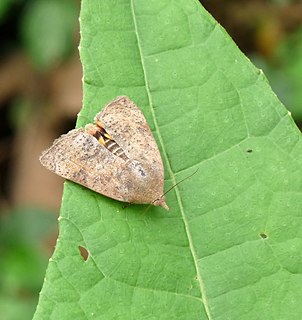Related Research Articles
180,000 species of Lepidoptera are described, equivalent to 10% of the total described species of living organisms. This is a list of the diversity of the Lepidoptera showing the estimated number of genera and species described for each superfamily and, where available, family. See Lepidoptera for a note of the schedule of families used.

The Pyralidae, commonly called pyralid moths, snout moths or grass moths, are a family of Lepidoptera in the ditrysian superfamily Pyraloidea. In many classifications, the grass moths (Crambidae) are included in the Pyralidae as a subfamily, making the combined group one of the largest families in the Lepidoptera. The latest review by Eugene G. Munroe and Maria Alma Solis, in Kristensen (1999) retains the Crambidae as a full family of Pyraloidea.

The Pyraloidea are a moth superfamily containing about 16,000 described species worldwide, and probably at least as many more remain to be described. They are generally fairly small moths, and as such, they have been traditionally associated with the paraphyletic Microlepidoptera.

Achille Guenée was a French lawyer and entomologist.

Hyblaeidae are the "teak moths", a family of insects in the Lepidopteran order. The two genera with about 18 species make up one of the two families of the Hyblaeoidea superfamily, which in the past has been included in the Pyraloidea. Recent phylogenetic studies find varying relationships of Hyblaeoidea among Ditrysian Lepidoptera: Mutanen et al. (2010) find the superfamily to group either with Pyraloidea, or – more often – with Thyridoidea or butterflies. The results of Wahlberg et al. (2013) and Heikilä et al. (2015) indicate a sister-group relationship with Pyraloidea.

Spilomelinae is a very species-rich subfamily of the lepidopteran family Crambidae, the crambid snout moths. With 4,132 described species in 340 genera worldwide, it is the most speciose group among pyraloids.
In biological taxonomy, circumscription is the content of a taxon, that is, the delimitation of which subordinate taxa are parts of that taxon. If we determine that species X, Y, and Z belong in Genus A, and species T, U, V, and W belong in Genus B, those are our circumscriptions of those two genera. Another systematist might determine that T, U, V, W, X, Y, and Z all belong in genus A. Agreement on circumscriptions is not governed by the Codes of Zoological or Botanical Nomenclature, and much be reached by scientific consensus.

Agrotera is a genus of snout moths in the subfamily Spilomelinae of the family Crambidae. It is the type genus of the tribe Agroterini and currently comprises 28 species distributed in the Afrotropical, Palearctic, Indomalayan and Australasian realm.
Micromartinia is a genus of moths of the family Crambidae. It contains only one species, Micromartinia mnemusalis, which is found in Costa Rica, Brazil, French Guiana and Venezuela.

Udea is a genus of snout moths in the subfamily Spilomelinae of the family Crambidae. The genus was erected by Achille Guenée in 1845. The currently known 214 species are present on all continents except Antarctica. About 41 species are native to Hawaii.

Lygropia is a genus of snout moths in the subfamily Spilomelinae of the family Crambidae. It currently comprises 66 species, which are mostly found in the tropical and subtropical regions of the Americas, Africa and Asia, but not in Australia.
Prionapteryx is a genus of moths of the family Crambidae.

Ancylosis cinnamomella is a species of snout moth in the genus Ancylosis. It was described by Philogène Auguste Joseph Duponchel, in 1836. It is found in most of Europe.

The Phycitini are a tribe of moths of the family Pyralidae.
The Anerastiini are a tribe of moths of the family Pyralidae.
Valdovecaria bradyrrhoella is a species of snout moth in the genus Valdovecaria. It was described by Zerny in 1927. It is found in Spain and France.
Valdovecaria umbratella is a species of snout moth in the genus Valdovecaria. It was described by Treitschke in 1832. It is found in France, Croatia, Turkey and on Sicily.
Valdovecaria unipunctella is a species of snout moth in the genus Valdovecaria. It was described by Pierre Chrétien in 1911. It is found in North Africa, including Algeria and Morocco.
Glaphyriinae is a subfamily of the lepidopteran family Crambidae. It was described by William Trowbridge Merrifield Forbes in 1923

Scopariinae is a subfamily of the lepidopteran family Crambidae. The subfamily was described by Achille Guenée in 1854.
References
- ↑ "global Pyraloidea database". Globiz.pyraloidea.org. Retrieved 2011-10-10.
| This Anerastiini-related article is a stub. You can help Wikipedia by expanding it. |